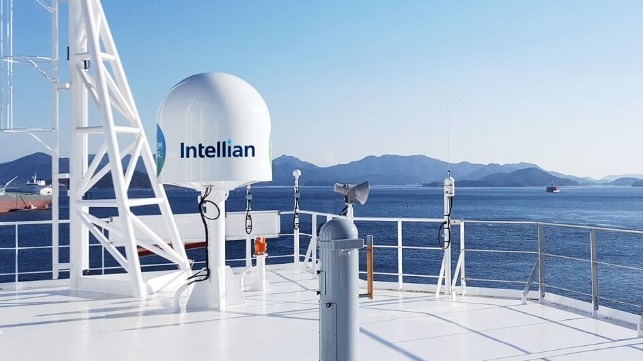Interview: Intellian VP Ben Swallow on the Future of Maritime Satcom

The satcom market has evolved rapidly in recent years, with new satellite constellations and new market entrants broadening the options for shipowners. The pace of technological evolution in orbit requires investment in new technology for maritime terminals, and Intellian has been on the leading edge of that drive. The firm recently opened a new R&D center in London to accelerate product development, adding to the research office it opened in South Korea last year. To learn more, The Maritime Executive spoke with Intellian's VP of Global Partnerships, Ben Swallow, who is representing the firm at the Nor-Shipping conference in Oslo.

that matters most
Get the latest maritime news delivered to your inbox daily.
TME: How is Nor-Shipping 2022 going so far?
It's been really good, I think everyone is keen to get back to normal after the pandemic. I think satellite communications and maritime are extremely sociable industries, we’ve really missed the face-to-face interaction.
TME: From your perspective, has the pandemic changed the demand for satcom services?
Since the pandemic ended, we’ve seen significant growth from all markets, and there is a great amount of investment in technology. There is a strong focus on technology refresh and there are a lot of new builds and projects to address within all maritime segments. There are multiple drivers for this investment, both in terms of operational efficiency and customers taking a closer look at providing more connectivity for crew welfare, as they see its importance for mental health, training and retention.
TME: Most technology companies have been affected by pandemic-related supply chain disruption - how has Intellian adapted?
We took some bold steps early into the pandemic and saw that there could be challenges ahead. We've built really strong relationships with our suppliers and we committed heavily, and so we've managed to emerge from this challenge relatively untouched, with stock distributed globally and shorter product lead-times for our customers.
There are other logistics challenges at the moment, like the availability of containers and the ability to ship product to overseas markets, which are issues for all manufacturers today. That is the main challenge that we've seen, rather than the ability to produce or accessing raw materials and components.
TME: How did your support network adapt to pandemic-related travel restrictions?
During the pandemic we encountered not only restrictions for accessing ports, but also travel and quarantine requirements from different countries. It was also a challenge because the restrictions were ever-changing, so it was difficult to keep track of the different rules from country to country.
That was a challenge, but we're very lucky that we have built a strong partner network and have over 500 service partners globally, so we didn't have a huge need for our own engineers to travel. We relied on the expertise and presence of our partners, and we managed to keep some good momentum considering the challenges.
TME: Intellian has just announced the opening of a new L-band research center in London. Can you tell us a bit about it?
Yes, it just opened in March, and it'll be open to customers in the next four weeks. We have opened a new R&D center in Korea last year, where we have a huge amount of engineering resources and develop some really innovative product lines. But we're working to expand our reach in terms of talent and bring in more expertise from different markets. London was selected as a great hub in terms of engineering talent, and it also brings us into proximity with network operators. It allows us to collaborate more closely and bring partners and customers into our facility, which helps us collect their feedback and bring products to market more quickly.
TME: Can you tell us a bit more about the decision to focus on the development of L-band products?
L-band is very resilient and it's used in critical communications. It's the most robust frequency, and L-band services are available with global coverage. It's typically slightly lower speed than Ku-band and Ka-band, but it's extremely reliable and terminals are smaller. At the new center, we're going to be designing and developing both enterprise and maritime products, expanding on the three L-band terminals we have in our portfolio today. The idea is to build on the success of those products and launch new ones to solve different industry challenges and support partner requirements.
TME: What are Intellian's broader plans for the next few years?
Well, we'll continue to invest heavily in our technology and new product lines. I don't think there's ever been a better time for the end customer in terms of the technological advances and the choices available in the market. There is constant disruption and innovation in satcom now, and that is going to bring the customer greater value.
I think we'll continue to push on the supply chain side of things, because the speed in which we can ship product is extremely important to our partners. Maritime is a very agile industry with a lot of moving parts, and our commitment to our partners and customers is that we'll get product to them as quickly as possible. That's why we've invested in our global fulfilment, expanding our warehouses and holding more stock than ever so that we can cope with increased demand.
TME: What are your customers saying they need most in terms of service?
We see a continuation of the trends of the last few years. Customers are looking for increased data speeds, increased coverage and increased network uptime. For the service-level agreements, partners and customers are looking for always-on connectivity. I think reliability and performance are more important than ever.
Many customers are now benchmarking their maritime satcom service against their land-based connectivity, and they are looking to deploy the same software and applications that they're using in their offices. Data performance is extremely important for those requirements.
